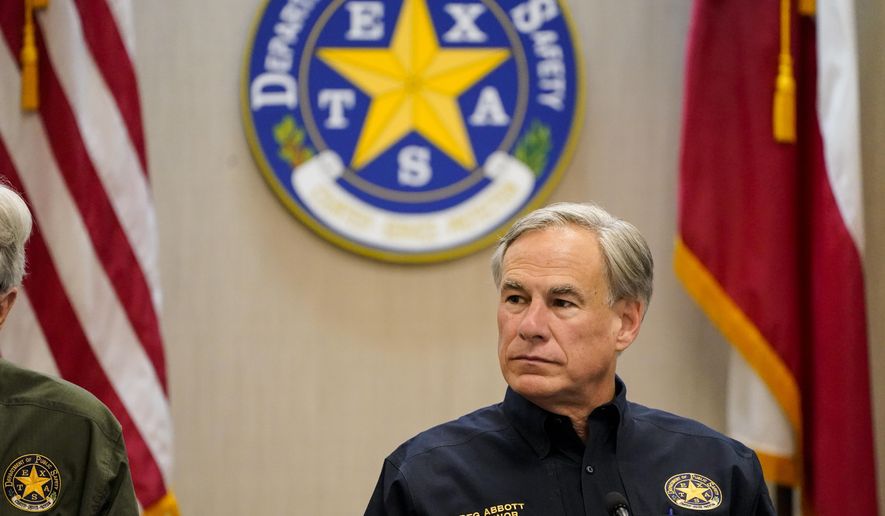The pandemic was the defining issue for many governors on the ballot last week, and those who pushed for the fastest reopenings after the initial wave of lockdowns were among the biggest winners.
Greg Abbott in Texas, Ron DeSantis in Florida and Brian Kemp in Georgia led the way by reopening in 2020 and in some cases even defied President Trump’s calls for a slower approach. These Republicans romped to reelection.
In Colorado, Gov. Jared Polis was the first Democrat to let a shutdown order expire in 2020. He also crushed his opponent.
“The ones that opened up the soonest in states that depended on tourism, service industries, those governors were rewarded by the voters like nobody else,” said Ford O’Connell, a Republican Party strategist based in Florida.
COVID-19 did not dominate the elections, which is news itself.
The pandemic, which helped unseat a sitting president in 2020 and helped install a Republican governor in Virginia in 2021, barely rippled across this year’s races.
Broadcast networks’ exit polling was peppered with pandemic questions in 2020 and last year, when Glenn Youngkin won the Virginia governorship. COVID-19 wasn’t mentioned much this year.
AP VoteCast, a different type of exit polling, asked voters about the big issues. COVID-19 was tied with foreign policy at just 2%.
“It’s just not an issue anymore. It doesn’t show up on the radar screen,” said Dave Carney, a Republican Party strategist working for Mr. Abbott in Texas.
Still, Mr. Carney said the pandemic had an effect.
Texas’ fast reopenings were linked to the state’s soaring economy, and voters rewarded Mr. Abbott.
“In Texas, we’ve been for a year now above pre-pandemic jobs. We’ve created more jobs in Texas than most of the rest of the country combined,” Mr. Carney said.
Contrast that with Nevada, a tourism-heavy state, where Gov. Steve Sisolak kept a pandemic state of emergency on the books until this May. The state didn’t recover all its lost jobs until July.
Mr. Sisolak lost reelection to Republican Joe Lombardo and became the only sitting governor to be ousted this cycle.
In Colorado, Mr. Polis was the first Democrat to announce a gradual reopening of businesses in 2020. He ended his state’s pandemic emergency in July 2021, nearly a year before Mr. Sisolak.
Mr. Polis trounced his opponent by 16 percentage points.
President Biden declared the pandemic over late this summer. Americans already well into post-pandemic lives yawned, but the medical community noted that COVID-19 was still contributing to hundreds of deaths a day.
David Dulio, a political science professor at Oakland University in Michigan, said voters this year just didn’t have an appetite for pandemic politics.
In Mr. Dulio’s state, Republican gubernatorial nominee Tudor Dixon tried to raise the issue in her challenge to Gov. Gretchen Whitmer. Ms. Whitmer claimed late in her campaign that she had shut down schools for only three months, when in fact some students had remote learning for more than a year.
Michigan still hasn’t recovered from its pandemic job losses.
Mr. Dulio said pandemic politics may have played well in primaries or for base voters but wasn’t going to win over independents and other persuadable voters who decided the Michigan race.
“You see the stark differences between campaigning in a Republican primary and a general election in 2022 on display with this issue,” he said. “It fired up Republicans, but the voters that Dixon needed to win the election in November didn’t care about it. And if they did, they may have sided with or at least given the governor a pass.”
Ms. Whitmer topped Ms. Dixon by nearly 12 percentage points.
In California, Gov. Gavin Newsom rolled to a 15-point win over his Republican opponent despite some of the nation’s toughest COVID-19 restrictions.
In September, California finally regained all the jobs it ceded during the pandemic.
Mr. Carney said the real problem for governors was hypocrisy.
New Mexico Gov. Michelle Lujan Grisham, a Democrat, ordered most businesses to shut down in early 2020 but then placed a jewelry order. Local news outlets reported that a jewelry store employee had to go unlock the shop, get the jewelry and deliver it, despite a ban on curbside sales at the time.
Ms. Lujan Grisham had a narrower-than-expected win over her Republican opponent last week and lost 5 points from her 2018 share of the vote.
New Mexico still hasn’t regained the number of jobs it had in February 2020, just before the pandemic.
For more information, visit The Washington Times COVID-19 resource page.
• Stephen Dinan can be reached at sdinan@washingtontimes.com.




Please read our comment policy before commenting.